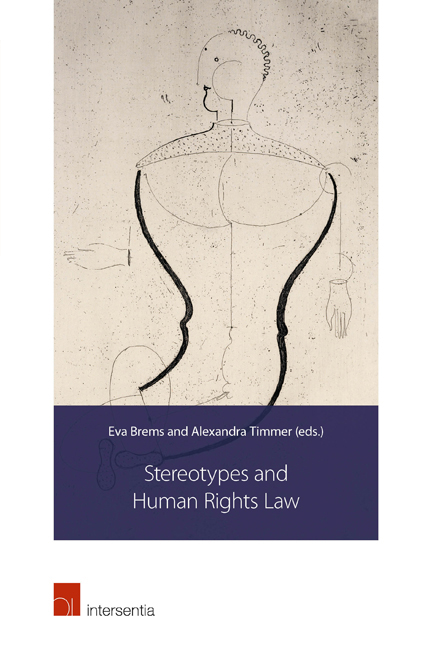Book contents
- Frontmatter
- Contents
- Introduction
- Building Momentum Towards Change. How the UN's Response to Stereotyping is Evolving
- Gender Stereotyping in Domestic Violence Cases. An Analysis of the European Court of Human Rights’ Jurisprudence
- Gender Stereotyping in the Case Law of the Inter‑American Court of Human Rights
- ‘My Sense of Humanity Has Gone Down the Drain’. Stereotypes, Stigma and Sanism
- Racial Stereotypes and Human Rights
- The Head of the Woman is the Man. The Failure to Address Gender Stereotypes in the Legal Procedures around the Dutch SGP
- Gender Stereotyping in the Military. Insights From Court Cases
Gender Stereotyping in Domestic Violence Cases. An Analysis of the European Court of Human Rights’ Jurisprudence
Published online by Cambridge University Press: 22 December 2017
- Frontmatter
- Contents
- Introduction
- Building Momentum Towards Change. How the UN's Response to Stereotyping is Evolving
- Gender Stereotyping in Domestic Violence Cases. An Analysis of the European Court of Human Rights’ Jurisprudence
- Gender Stereotyping in the Case Law of the Inter‑American Court of Human Rights
- ‘My Sense of Humanity Has Gone Down the Drain’. Stereotypes, Stigma and Sanism
- Racial Stereotypes and Human Rights
- The Head of the Woman is the Man. The Failure to Address Gender Stereotypes in the Legal Procedures around the Dutch SGP
- Gender Stereotyping in the Military. Insights From Court Cases
Summary
Stereotyping has definitely appeared on the radar of the European Court of Human Rights (ECtHR, the Court or the Strasbourg Court). In several recent rulings, notably the Grand Chamber judgments of Konstantin Markin v Russia and Aksu v Turkey, the Court has taken issue with gender-based and race-based stereotypes. Konstantin Markin concerned Russia's refusal to grant parental leave to a military serviceman. This is an important ruling, because the Court held that the state could not rely on gender stereotypes to justify differences in treatment between men and women under Article 14 of the European Convention on Human Rights (ECHR). Aksu concerned government-sponsored publications, which included derogatory stereotypes about Roma. The importance of this judgment, as seen from an anti-stereotyping perspective, is that the Court explicitly recognises that stereotyping can negatively impact the right to private life (Article 8 ECHR).
In this chapter, rather than comprehensively analysing and critiquing the ways in which the Strasbourg Court addresses (and fails to address) stereotypes, we zoom in on the Court's case law regarding domestic violence against women. In a volume dedicated to exploring the ways in which stereotyping is a human rights issue, violence against women (VAW) – and specifically domestic violence against women – is a particularly salient and thorny issue. International human rights law – as will be discussed further below – recognises that there are close links between pervasive gender stereotyping and VAW. The issue remains surprisingly under-examined in the ECtHR literature, however.
This chapter argues that the Court should address gender stereotyping in domestic violence cases and in that respect follow international human rights law. That is not to say that we think the Strasbourg Court can eliminate gender stereotypes. We think of the Court as one actor in a larger effort directed against the harmful gender stereotypes underpinning domestic violence. This effort is organised on many fronts, both legal and non-legal (such as via media, education and politics). Yet the only way the Court can play its role, this chapter further argues, is by carefully crafting legal reasoning that names and contests stereotypes. In naming gender stereotypes, the Court will be addressing one of the factors that structurally contributes to domestic violence and ineffective state responses.
- Type
- Chapter
- Information
- Stereotypes and Human Rights Law , pp. 39 - 66Publisher: IntersentiaPrint publication year: 2016
- 3
- Cited by



